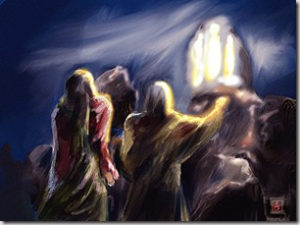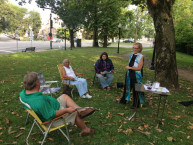 February 26, 2017: May God’s words alone be spoken, may God’s words alone be heard. Amen.
February 26, 2017: May God’s words alone be spoken, may God’s words alone be heard. Amen.
So, if I seem a little flaky today – or should I say, more flaky than usual – it might be because I stayed up till midnight trying to charge all my electronic devices because I had no power due to that insane storm we had blow through here. And then, was awakened at about 2 am by all the lights and the TV coming on suddenly when the power was restored, which left me moving about the house shutting everything off.
Given all of that, as I was working on this sermon without electricity, I kept thinking – this would be an AWESOME time for the brightly lit transfigured Jesus we hear about in our gospel today to not only be in my heart, but in my house! Sadly, that did NOT happen.
Now, the past few weeks, or months really, I have felt called to preach against the bigotry, hate, and injustice that has crawled out from under the floorboards of humanity in great numbers of late. And we must continue to be, all of us, prophetic witnesses against it, spreading instead the gospel message of love and inclusion. This, however, is not that sermon. Today, perhaps because of the darkness of the room in which I prayed and worked on this sermon, or perhaps because this is the last Sunday before Lent, today will be a different message.
I remember a business story from a long time ago about a man interviewing for a position at a prestigious company. He was nervous, but did his best to present well in the interview with the big boss. After the young man left the interview, the hiring CEO went to the windows of his office to look out on the bustling street below, only to see the young man he had just interviewed stooping down on the sidewalk. He watched as the man picked something up, looked at it, smiled, and placed it in his pocket. The CEO called downstairs to have someone bring this young man back in the building. The CEO asked him, “why was it that you were stooping in the midst of that busy sidewalk?” Embarrassed, the young man said, “I saw this bright penny, and picked it up.” The CEO said “You, young man, are hired.” Asked later why, the CEO replied, I wanted someone who is so unjaded, that the sight of something bright, that others consider worthless, catches his eye. Someone who pays attention to small things as much as the big picture.”
This is a bit of what the story of the transfiguration is all about. See, the gift of that young man was that he paid attention to see the small glint of something amidst the din of the world. It wasn’t about what it could bring him – truly, stooping to pick something up on a busy sidewalk in the city is a brave thing to do, you are likely to get knocked about by folks who are texting or rushing to get to, well, wherever is so important that they don’t see anything else. And what he picked up is of very little value in terms of what it could buy him. Still, he saw it, he stopped, and he picked it up. But just as important…the CEO noticed him, and then employed him to build up his company.
The transfiguration story takes us to a place where some are not quite comfortable – because it is a story that forces us to move beyond what we think we know, beyond the bounds of the ordinary to the extraordinary. And you see, we have forgotten how to do that.
Sometimes, many times (and in some ways I hope always) folks come into church searching for something…searching for the transcendent, for something outside what they know, in order to make what they know make sense. In the context of a single service, they may get a glimmer, but perhaps not all of what they hoped. And I say to them…just keep coming. What I mean by that often is – keep coming, keep walking through the doors, keep sitting down in a pew…and keep your heart open to wonder and questions. That’s right – questions. Questions are essential to faith. They are the key that unlocks doors of the amazing!
The Jewish Rabbi and theologian, “Abraham Heschel, once said “Our goal should be to live life in radical amazement. Get up in the morning and look at the world in a way that takes nothing for granted. Everything is phenomenal. To be spiritual is to be amazed.”
“…live life in radical amazement…”
What would that be like?
“For us to be spiritual is to sometimes be introspective, or be religious, but sometimes it is about amazement. Something about Jesus or theology will always break-through in a way that cannot be explained. Sometimes it is for us to just be in wonder.””[1] Sometimes, all times really, that wonder comes in the form of, or in answer to, a question. Because questions come out of openness, possibility, seeking what one does not already know or comprehend. Unlike Peter, who always seems to be talking or doing himself into a pickle, completely missing the point, we need to perhaps be more like Thomas, one of the most faithful of the disciples in my book, and one not afraid to ask questions, or to step boldly forward into the answers, or really just into the possibility of an answer. And so, I think we need to consider this gospel passage in a new way – a way that invites us in, that welcomes the wonder.
We are so familiar with this story – we hear it every Sunday just before Lent from each of the synoptic gospels – Matthew, Mark, and Luke. We have crammed so much meaning into it, have heard it deconstructed in so many ways, all valuable, or so I hope, but perhaps…perhaps this is a story that this year, we should just let it be. By that I mean, perhaps we need to hear it a bit differently – so that we can let go and hear it fresh, like the way the renowned priest and prolific author Barbara Brown Taylor tells it:
“It starts with a long climb up a windy mountain [path] in the fading light of day, hunting for a strong place to pray. No talking for once. No wall of words between you and the others. Just breathing for once, just hearing them breathe, until you can’t tell whether you are breathing or being breathed. Are you hyperventilating?
Sit down. You are here to pray, so get on with it. Pray until you are weighed down with sleep. Pray until it is dark enough to see light through your eyelids where light should not be. You don’t really want to open your eyes to see where the light is coming from. But you kind of do. But you don’t. Then you look.
And there he is: someone you thought you knew really well, standing there pulsing with light, leaking light everywhere. Face like a flame. Clothes dazzling white. Then, as if that weren’t enough, two other people are there with him, all of them standing in that same bright light. Who are they? Can’t be. Moses. Elijah. Dead men come back to life. God’s own glory, lighting up the night. Now they’re leaving. Now Peter’s saying something. [Peter’s always saying something]
Tents, he’s saying. We need tents. He thinks we’re on Sinai. Someone tell him we’re not on Sinai. Now there’s a cloud coming in fast that is way more than weather, a terrifying cloud that is also alive. Cutting Peter off. Covering everything up. Smells like a lightning strike. Can’t see a thing.
Then a voice from the cloud lifts the hairs on the back of your neck. Fear so fast and primitive, you’re bristling like a dog. What’s the voice saying? Not “listen to me” but “listen to him.” The Son, the Beloved. But listen to what? He’s not saying anything. He’s shining. Or at least he was. Now he’s not. Now it’s over. Now what?”[2]
Now what?
Now we come down off of the mountain…and we walk. We walk into Lent. We walk with our questions, as we walk with the answers…the ones we don’t see, the ones yet to be revealed. And that is why Lent, which begins this week on Ash Wednesday, is so very powerful. It is a time of questioning, searching, returning, experiencing. A time to pay attention to the small things, the pennies amidst the din of life. A time to let wonder and amazement happen – or really, to see the wonder and amazing that is right there in front of us – happening all the time.
Because if we ever hope to continue the work we are called to do – to stand and proclaim the good news that everyone is a beloved child of God – to speak out against any person or institution that would harm our brothers and sisters, to fight against oppression, poverty, and the “ism” of the day – we must pause for a moment, turn off the constant barrage of news, and regain our sense of wonder, our faith of radical amazement, that we might see what is shining right in front of us, in the midst of the noisy world.
Because the wonder of the Christian experience is ours to see and feel…we just need to be open to it, but not always search for it, to ask questions, but not need answers. To sometimes just say “I don’t know – at least not yet.” To see the transfigured, the transcendent, that is in front of us every day – the Christ in ourselves and in the world. To live life in “radical amazement.”
That, my friends, is why we get the transfigured Jesus now – just as we turn with Jesus toward Jerusalem in Lent. It is the moment we grab off the mountain, the shining glint of hope we pick up amidst the din, the gift of wonder we carry in our hearts as we strip away the trappings of church and life that distract us.
It is the time we allow ourselves to simply be, rather than do, to listen rather than speak, to question…yes, to question…because we just might be in awe of what we find. And when we see what others fail to see, it is then we are most able to be put to use building up something far more important than a company.
Amen.
For the audio from the 10:30am service, click here:
[1] SermonBrainwave from workingpreacher.com.
[2] http://day1.org/5560-the_bright_cloud_of_unknowing
Rev. Diana L. Wilcox
Christ Church in Bloomfield & Glen Ridge
February 26, 2017
The Last Sunday After The Epiphany
1st Reading – Exodus 24:12-18
Psalm 2
2nd Reading – 2 Peter 1:16-21
Gospel – Matthew 17:1-9




